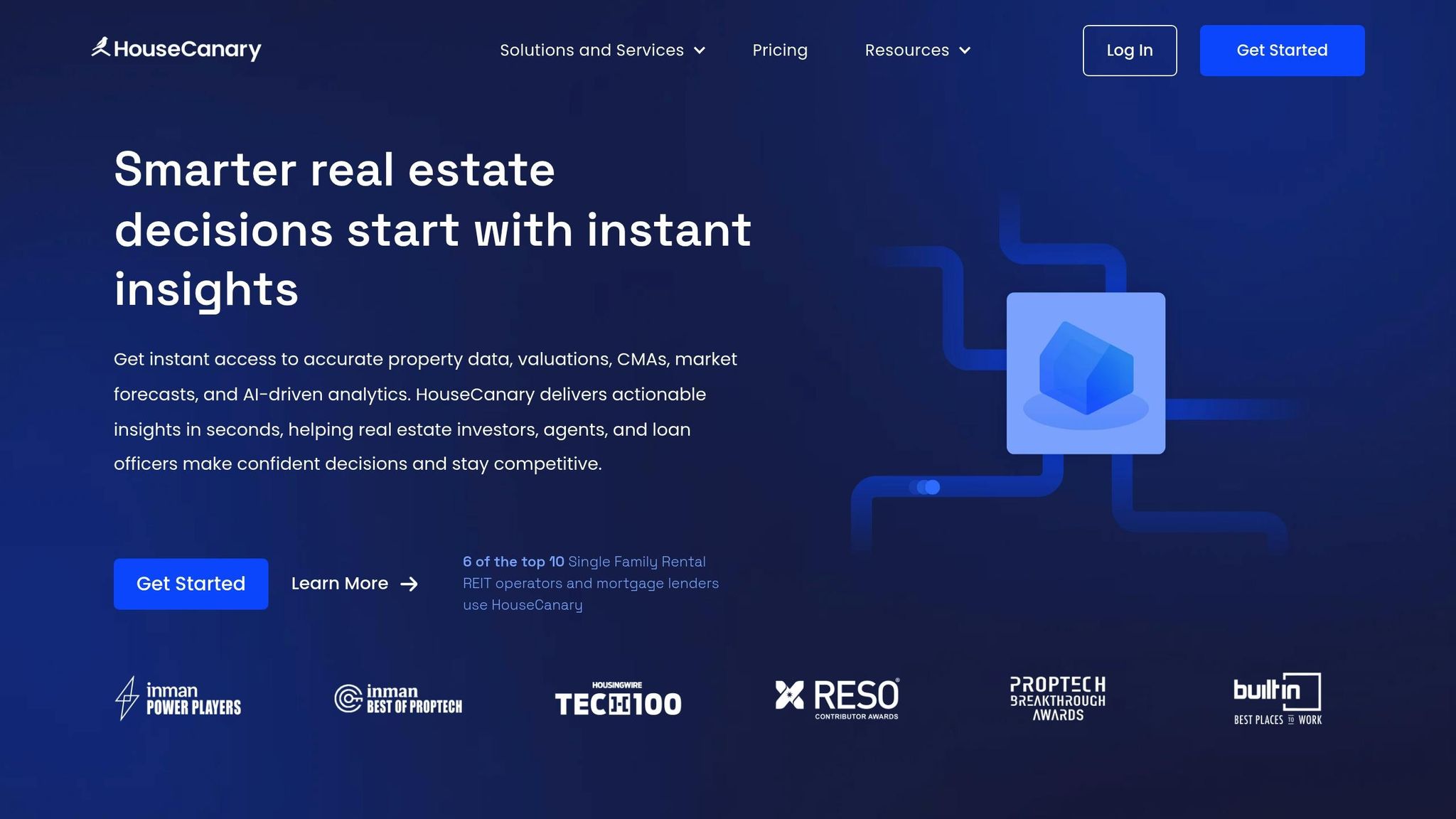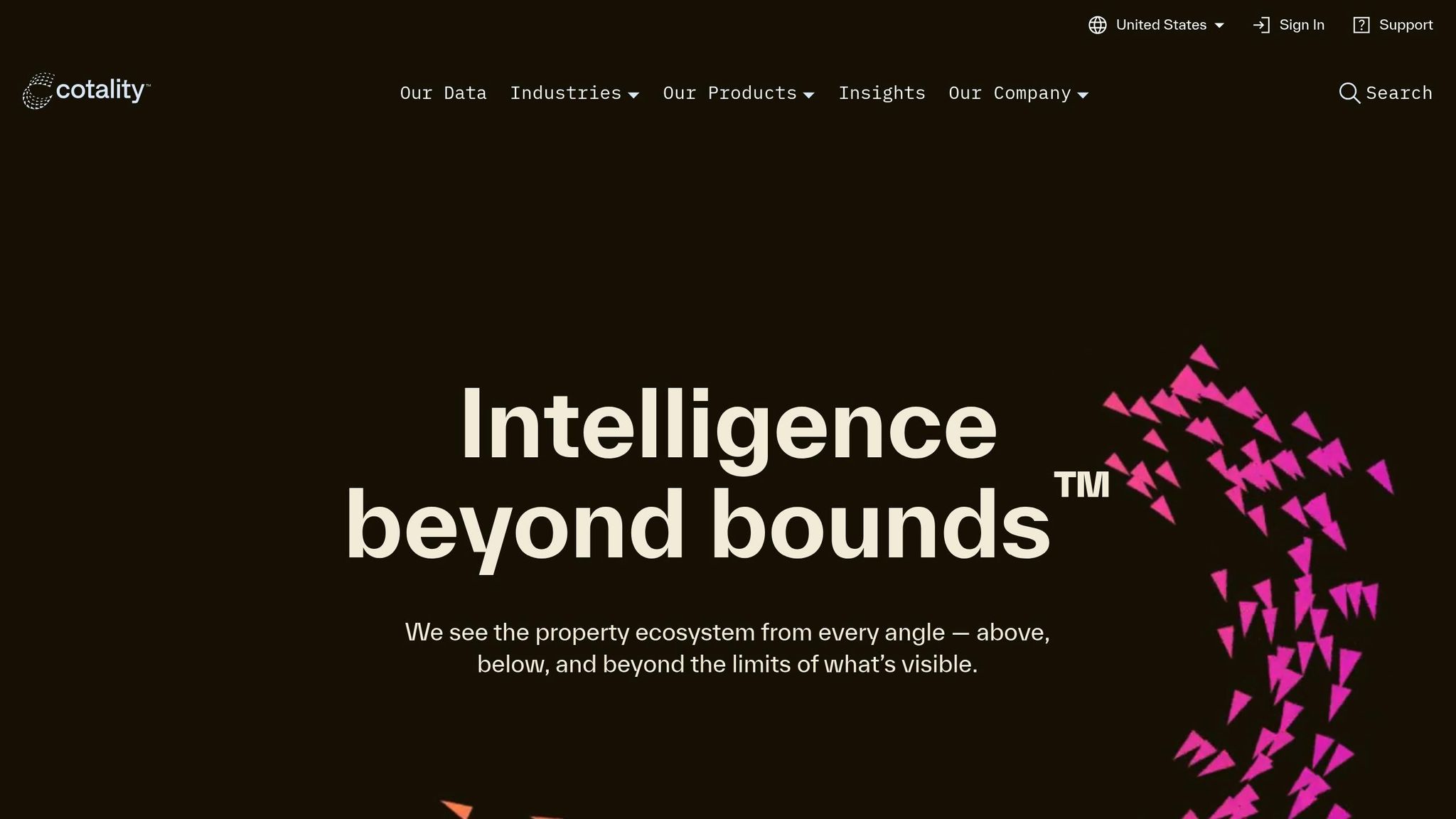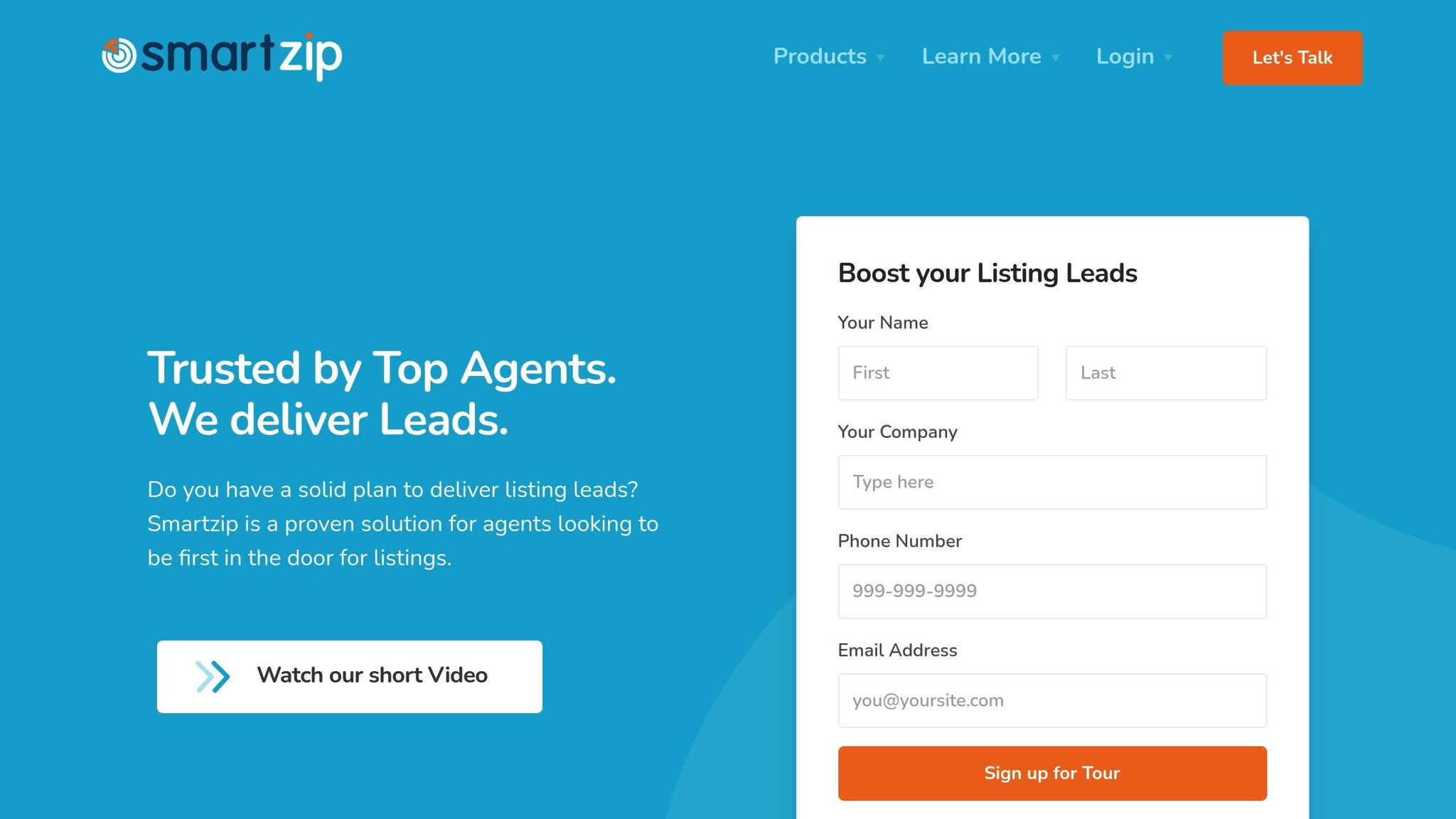AI Tools for Regional Real Estate Market Analysis
Artificial intelligence is changing how real estate professionals analyze and predict market trends. AI tools process vast amounts of data like MLS listings, property records, and demographic trends, offering precise insights into regional markets. This helps investors, agents, and developers make smarter decisions faster.
Key points:
- AI uses forecasting models to identify market patterns and predict changes.
- Tools analyze factors like school quality, crime rates, and infrastructure to assess property values.
- Regional analysis is critical since markets vary by location due to regulations, economic conditions, and buyer behavior.
Top tools include:
- HouseCanary: Offers property valuations and market forecasting across the U.S.
- CoreLogic: Focuses on extensive property data and risk management.
- Smartzip: Predicts seller activity and automates lead targeting.
- LeadList.Pro: Specializes in distressed property leads in Massachusetts.
Each tool has unique strengths, from affordability to localized data accuracy, helping professionals tailor their strategies to specific regions.
Dominate Your Local Real Estate Market with These AI Tools
Top AI Tools for Real Estate Market Analysis
These AI-powered platforms provide some of the most effective solutions for analyzing regional real estate markets across the United States. Each tool takes a unique approach to processing data and delivering actionable insights.
HouseCanary

HouseCanary specializes in accurate property valuations and market forecasting, covering all 50 states. It’s a go-to resource for a wide range of real estate professionals, from investors to mortgage lenders. By leveraging AI, the platform processes vast amounts of regional data to uncover investment opportunities and assess market risks.
What makes HouseCanary stand out is its versatility. Real estate investors use it to evaluate potential acquisitions, while mortgage lenders rely on its precise valuation models. Additionally, its off-market lead generation tools help agents spot properties before they’re listed on the MLS.
HouseCanary analyzes local trends, demographics, and historical data to predict market performance. This makes it an essential tool for portfolio management and strategic planning, especially for navigating different geographic markets.
CoreLogic

CoreLogic's Araya platform is known for its extensive property data and analytics, covering nearly every property in the U.S. Industry professionals use it to streamline data interpretation and preparation, thanks to its AI-driven capabilities.
One of CoreLogic’s key strengths lies in its geospatial solutions and climate resilience assessments. It also provides precision marketing tools that help agents share market trends and engage prospective sellers more effectively. With its strong focus on risk management, CoreLogic is a trusted choice for professionals working across varied regional markets.
Smartzip

Smartzip takes a predictive approach, focusing on identifying homeowners who are most likely to sell. By analyzing over 2,000 data points, it forecasts seller activity and helps agents address the challenges of low seller intent and immediate agent selection [1].
The platform’s SmartTargeting feature pinpoints high-potential leads and automates marketing efforts, providing agents with full homeowner contact details. This targeted strategy saves time and resources by zeroing in on those most likely to sell.
Smartzip also enhances regional analysis with tools like SmartTargeting, Market Pulse, and Reach 150, offering real-time insights and streamlining lead management. This makes it particularly effective in competitive markets where every lead counts.
LeadList.Pro

While Smartzip focuses on predicting seller behavior across various regions, LeadList.Pro hones in on distressed property opportunities specifically in Massachusetts. This platform uses AI to provide probate and preforeclosure leads, each assigned an AI-generated distress score for prioritization.
LeadList.Pro delivers leads with verified property and contact details, ensuring seamless integration into agents’ workflows. By combining real-time data from Massachusetts probate courts and preforeclosure filings with manual verification, the platform ensures a high level of data accuracy.
Another unique feature is its AI Street View Analysis, which enhances property evaluation across Massachusetts counties. With flexible pricing based on regional needs, weekly lead updates, and no minimum commitments, LeadList.Pro allows agents to adjust their approach as market conditions shift. This targeted focus highlights how niche AI tools can deliver precision in specific regions.
AI Tool Comparison
Tool Comparison Table
Here’s a quick look at the pricing for some popular AI tools used in regional real estate market analysis:
| Tool Name | Pricing (USD) |
|---|---|
| HouseCanary | Starting at $16/month [2] |
| CoreLogic | Starting at $149/month [2] |
| Smartzip | Custom pricing |
| LeadList.Pro | $99–$249/month by county |
This table gives you a snapshot of how pricing varies among these tools, helping you weigh your options. If you're just starting out or have a smaller team, HouseCanary offers an affordable entry point at $16/month. For those needing access to broader data, CoreLogic starts at $149/month and provides extensive coverage. LeadList.Pro uses a county-based pricing model, ranging from $99 to $249/month, making it a good choice for professionals targeting specific regions like Massachusetts. Lastly, Smartzip offers custom pricing tailored to your needs, which requires a consultation to determine. Each tool’s pricing reflects its data capabilities, giving you the flexibility to choose the one that aligns with your goals and budget.
sbb-itb-fc184bb
How to Choose the Right AI Tool
Picking the best AI tool for analyzing regional real estate markets requires a thoughtful evaluation of key factors. A poor choice could lead to missed opportunities and wasted resources, while the right tool can provide actionable insights tailored to your target market.
Data Accuracy and Freshness
In the fast-paced real estate world, real-time data is a game changer. Outdated information can ruin deals, especially in time-sensitive scenarios like probate or preforeclosure opportunities. Look for tools that constantly update and validate their data, using both AI and manual checks. This ensures you're capturing critical updates like court filings, ownership changes, and property details as they happen.
Pay attention to how the tool manages data validation. Some platforms cross-check data across multiple sources, while others rely on a single stream. Tools that verify details like property ownership, contact information, and legal status through multiple channels tend to deliver more reliable insights, helping you make smarter investment decisions.
Once you’ve ensured the tool provides accurate and current data, check whether it offers detailed insights specific to your region.
Geographic Coverage and Detail Level
When it comes to real estate, county-level precision is key. A tool that dives deep into your target markets will always outperform one that spreads itself thin across the entire country. Platforms with a strong grasp of local market dynamics and regulatory nuances are far more effective for regional analysis.
Regional specialization often leads to better data quality. Tools focused on specific states or regions usually have stronger relationships with local courts, assessor offices, and other data sources. This means you’ll get more reliable and comprehensive information for your chosen market.
Also, consider the level of detail the tool provides. Some platforms offer insights down to the neighborhood level, while others stick to broader city or county summaries. The right choice depends on your investment strategy and the level of granularity you need to make informed decisions.
Integration and Compliance
Good data is just the beginning - seamless integration and compliance are equally important. A tool’s ability to fit into your existing workflow can make or break its usefulness. The best platforms integrate effortlessly with your CRM, marketing tools, and analysis software. Look for options that allow you to export data in user-friendly formats like CSV files, which can be easily imported into your systems.
Privacy regulations in real estate are strict, so ensure the tool complies with federal and state laws regarding data handling. Features like encryption, secure data transmission, and controlled access are non-negotiable.
Ease of use is another critical factor. A user-friendly interface speeds up decision-making and reduces the time spent on training. Complicated tools that require extensive onboarding can slow your team down and discourage adoption.
Finally, consider the support and scalability offered by the provider. Look for tools with comprehensive onboarding, regular training updates, and responsive customer service. As your business grows, your tool should be able to handle increased data demands, more users, and broader geographic coverage. Fixed pricing models can also provide better cost predictability compared to usage-based plans.
Final Recommendations
AI tools have reshaped the real estate landscape, turning what used to take weeks of manual research into just hours of precise, data-driven insights. The key to success lies in choosing a tool that aligns with your market focus and investment strategy. Here are some essential tips to guide your decision.
For those focusing on distressed properties in Massachusetts, LeadList.Pro is a standout option. It offers AI-enhanced probate and preforeclosure leads, leveraging real-time court data, manual verification, and AI-generated distress scores. With pricing tailored to specific counties, ranging from $99 to $249 per month, it’s designed to address the unique challenges of Massachusetts’s distressed property market.
A tool’s regional expertise is critical. Platforms with strong local data connections provide more timely and accurate insights - an absolute must in markets where legal processes, filing requirements, and market dynamics can vary widely. Matching your market focus with a tool that understands your region ensures you’re working with the most relevant data.
The best real estate professionals rely on multiple methods of data validation. Seek platforms that combine AI algorithms with human verification to cross-check property details, ownership records, and contact information. This dual-layered approach minimizes the risk of chasing outdated or inaccurate leads.
Ease of integration is another important factor. Look for platforms that export data in standard formats like CSV and can seamlessly connect with your CRM or analytics tools. A user-friendly interface that reduces training time is also a big plus, saving you time and improving workflow efficiency.
When it comes to pricing, scalability matters. Fixed monthly rates often provide more predictable costs compared to usage-based pricing models, especially as your business grows. County-based subscription options are particularly helpful, allowing you to expand into new markets gradually without committing to costly statewide plans.
Finally, prioritize tools that update their data continuously rather than relying on weekly or monthly refreshes. In the fast-paced world of distressed property markets, being the first to contact motivated sellers can make all the difference in securing a deal.
FAQs
::: faq
How do AI tools improve real estate market analysis compared to traditional methods?
AI tools are transforming how real estate market analysis is done, offering quicker and more precise insights compared to older methods. By harnessing advanced algorithms, these tools deliver accurate property valuations, predictive analytics, and the latest market trends, empowering users to make smarter decisions.
Take, for instance, AI platforms that focus on providing in-depth property details like ownership history, transaction records, and risk evaluations. These tools handle complex data analysis automatically, reduce the chances of human error, and generate real-time forecasts. For real estate professionals, this means a significant advantage over the slower, manual methods of the past. :::
::: faq
What should I look for in an AI tool to analyze regional real estate markets effectively?
When choosing an AI tool for analyzing regional real estate markets, prioritize its capacity to incorporate local data such as demographics, employment patterns, and infrastructure projects. These elements are essential for understanding and predicting housing demand in a specific area.
Look for tools that utilize predictive analytics and machine learning to deliver accurate trend forecasts. This should include insights based on economic indicators like interest rates, GDP growth, and localized housing demand. It's also important that the tool can pull data from diverse sources - like property listings, historical sales records, and market reports - to create a comprehensive and customized analysis for your target region. :::
::: faq
How can AI help real estate professionals find and focus on distressed property opportunities?
AI tools give real estate professionals a powerful edge in spotting distressed property opportunities. By sifting through massive datasets, these tools can identify properties at risk of foreclosure or those likely to sell below market value. They draw insights from sources like legal records, foreclosure filings, and mortgage data, often uncovering leads before they hit the mainstream market.
To help prioritize these opportunities, AI assesses factors such as default risk, property condition, and market trends. This targeted approach allows professionals to focus their time and resources on the most promising investments, streamlining their efforts while maximizing potential returns. :::



